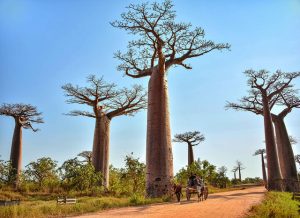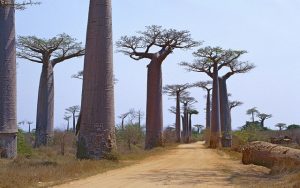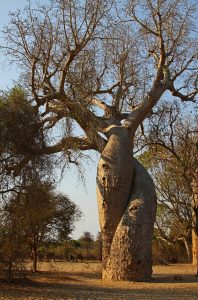Hidden on the western coast of the island and nestled on the edge of Kirindy Mitea National Park, the Avenue of the Baobabs remains a popular attraction despite being hours away from major cities and tourist resorts. So what specifically about the destination makes the long drive well worth it? We could tell you the view of the martian-like trees that resemble giants from a J.R.R. Tolkien book is a good enough reason, but there’s more to the 98-feet high trees than meets the eye. The baobab trees play an integral role in both the animal kingdom and the local culture that have learned to depend on them.

Courtesy of Rod Waddington/Flickr.com
Facing the threats of deforestation, tourists are advised to make the journey to see one of the unspoken natural wonders of the world before it’s gone. Conservation groups are currently making efforts to preserve the trees (some have been around for more than 800 years) by making them recognized as a natural monument and a boost to the tourism industry. Just by looking at them, most people assume trees that appear lifeless don’t offer very much to the ecosystem. Look harder and you’ll see large fruits in some of the high branches. The fruit (also called monkey bread) is so nutritious that baboons have learned to depend on them in a land where food can be scarce. The trunks with its enormous girth is compromised of almost 80% water so on days when the sun is unforgiving and there is a limited supply of water, animals turn to its bark to hydrate.
When visiting the Avenue of the Baobabs, guests are pleasantly surprised by the extraordinary scenery that’ll make them question they didn’t stumble into a Mario Bros. video game. Other people have reported feeling like venturing into an “upside down” world because the trees look they’re growing in reverse, with the roots exposed in the air. To get there, visitors will travel down a long dirt road from Morondova. The avenue isn’t part of a national park, so there’s no admission fee (except for parking) to see the trees, but there is a small information center where you can stop to get a map and learn the routes. During the drive, the trees line the side of the road, creating a canopy.

Courtesy of Bernard DUPONT/Flickr.com
Keep in mind, the road will be bumpy and requires an experienced driver. Nearby hotels will either offer up personal tours with a skilled guide or arrange an experienced cab driver that knows his way around the land to pick you up. But if you are driving on your own, drive with caution. Traveling by bike or on foot is also an option. Once you’ve traveling through, the fun doesn’t have to end there. Visitors are also given tips by locals to travel about 7 km north to see the famous Baobab Amoreux (or Baobabs of Love), a monument of two trees intertwined like star-crossed lovers. According to local lore, the two baobab trees became connected and twisted into one after seeing two young couples in love from a nearby village. After witnessing the tryst, the trees longed to feel romantic emotions, and over centuries, have grown toward each other to embrace.

Courtesy of vil.sandi/Flickr.com
Nearby Morondava has several accommodation where you can get a comfy nightcap to avoid driving back to a major city in one day. Morondava also has beaches on its western coast that are often packed with expats lounging in the sun. Restaurants and shops are used to tourists and are very happy to assist visitors on anything they need. Popular hotels that tourists visiting the Avenue of the Baobabs often stay at include Chez Maggie Hotel & Restaurant (beach front), Hotel Le Sun-Beach, Rosewood Hotel Restuarant & Spa (great for a relaxing retreat after exploring the baobabs). For those on a budget, camping is also an option at Tanankoay which has trails that takes you directly to the beach and to its wilderness. The campground has tiny huts that can be rented out for the night.
More from AFKTravel:
The Top Beach Hotels In Madagascar
5 Tips For Getting Around In Madagascar
10 Things To Know Before You Travel To Madagascar

